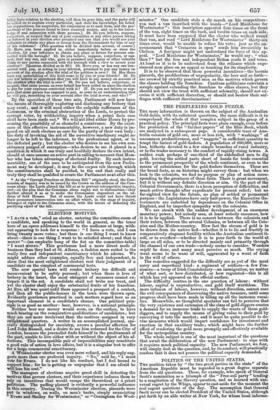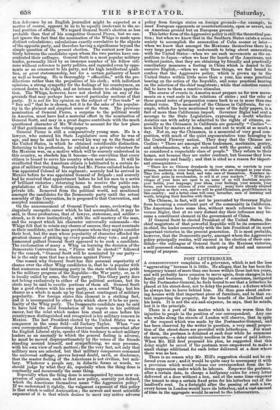POLITICS OF THE UNITED STATES.
THE position taken by "the two great parties in the state" of the American Republic must be regarded in a great degree separate from the old questions. Those, for example, who speak of General Scott's nomination as a triumph of the "Free-soil party" tending to a reagitation of the Slavery question, and as learned with unk- versal regret by the Whigs, appear to cast aside for the moment the real cogent questions of the day. The assumption that General Scott never can be elected President of the United States although put forth by an able writer at New York, for whose local informa- tion deference by an English journalist might be expected as a matter of course, appears to us to be equally irrelevant to the ac- trial position of affairs. We regard General Scott's election as less probable than that of his competitor General Pierce, but we can- not ignore the fact that the nomination of the Whigs is made upon distinct calculations; calculations exactly correlative to the objects of the opposite party, and therefore having a significance beyond the simple question of the present election. The contest now lies en- tirely between the candidates upon whom the two parties have con- centrated their suffrages. General Scott is a most popular military leader, personally liked by an immense number of his fellow citi- zens without reference to party polities, and regarded even by oppo- nents as an ornament to his party, not for high intellectual quali- ties, or great statesmanship, but for a certain gallantry of heart as well as bearing. Ile is thoroughly " officerlike," with the pre- dilections rather than the prejudices of his cloth ; with indistinct opinions, a strong sympathy for the feelings of his countrymen, an earnest desire to do right, and an intense desire to obtain approba- tion. The Whigs, however, have not elected him on any of the grounds that may perhaps have moved particular sections of that party. It is not for his opinion on the subject of "free trade" or "free soil" that he is chosen, but it is for the sake of his popular- ity in the plainest and simplest sense of the term. The previous nomination of General Pierce, a surprise to the political world in America must have had a material effect in the nomination of General Scat, and may in a great degree contribute with the much questioned character of Mr. 'Webster to account for the low place of that gentleman on the voting-papers.
General Pierce is still a comparatively young man. He is a lawyer, who entered his State Legislature soon after he was of age, and may be said to have served his way up to the Senate of the United States, in which he obtained considerable distinction. Returning to his profession, he enlisted as a private volunteer for the Mexican war, on a motive which will be scarcely understood in this country, so obsolete has it become—the conviction that every citizen is bound to serve his country when need arises. It will be recollected that the American citizen is habituated to a certain de- gree of military training. Scarcely had Mr. Pierce enlisted before he was appointed Colonel of his regiment; scarcely had he arrived in Mexico before he was appointed. General of Brigade ; and scarcely had he received that appointment before he led his men in a series of brilliant victories returning home to receive the public con- gratulations of his fellow citizens, and then retiring again into private life. Removed from the political world, not mentioned amongst the candidates for the Democratic party until the actual assembly of the Convention, he is proposed to that Convention, and accepted unanimously. On the announcement of General Tierces name, reviewing the singularly energetic career which he had accomplished, it may be said, in three professions, that of lawyer, statesman, and soldier— struck, as it were instinctively, with the self-mastery of the man, and the respect which his character universally commands—the Whigs felt that to retain any chance of success, they must nominate as their candidate, not the man perchance whom they might consider their best, but the man whose popularity of character afforded the greatest chance of picking up every possible stray vote ; and good- humoured gallant General Scott appeared to be such a candidate. The exclamation of many a Whig on learning the decision of the Democratic Convention was "Pierce will be elected !" followed by the remark, "General Scott will be nominated by our party— he is the only man that has a chance against Pierce."
One reason why General Scott has this personal superiority of chance over the other Whig candidates is, that he is popular with that numerous and increasing party in the state which takes pride in the military progress of the Republic—the War party, or, as it is locally called by some, the Glory party. This Glory party does not belong exclusively to either of the political sections, but its circle may be said to overlie portions of them all. General Scott has a good chance with his own party, as a sound Whig ; but his chance as a whole is made up by that great contingent of military popularity. For foreign states this element is a striking fact, and it is accompanied by other facts which show it to be no pecu- liarity of the Whig party. The Democratic candidate may be said to have laid the solid foundation of his repute in his political career, but the éclat which makes him stand at once before his countrymen distinguished and recognized is his military renown in Mexico. The last President elected by the United States was a conqueror in the same field—old Zachary Taylor. When "our own correspondent," discussing American matters somewhat after the English Liberal style' .speaks of this tendency to select military leaders as an anomaly to which the general feeling is adverse, he must be moved disproportionately by the voices of the friends Mending around himself, and sympathizing, we may presume, with his own view of such matters ; for the very fact, not only that military men are selected, but that military conquerors command the universal suffrage, proves beyond doubt, cavil, or disclaimer, that the master feeling of the Americans is not civilian, but mili- tary. Whatever a people say, in didactic forms or words, we should judge by what they do, especially when the thing done is constantly and recurrently the same thing.
Especially when the thing done is accompanied by some new ex- pression of opinion, such as that new policy, scarcely yet defined, which the Americans themselves name "the Aggressive policy." If we understand it rightly, the vulg-arest exponent of this policy is that which is called Annexation ; the newest and most scientific exponent of it is that which desires to meet any active adverse policy from foreign states on foreign grounds—for example, to meet European opponents or counteractionists, open or covert, not on American ground but on European ground.
This latter form of the Aggressive policy is still the theoretical por- tion • but when we know that in the Southern States exists a secret society to accomplish the annexation of Cuba sooner or later— when we know that amongst the Mexicans themselves there is a very large party agitating underneath to bring about annexation with the United. States—when we see such movements as the ex- pedition to Japan—when we hear the boasts of the Americans, not without justice, that they are obtaining by friendly and practically conciliatory measures a footing in China which is denied to the coercive English,—when we note these things, we feel bound to confess that the Aggressive policy, which is grown up in the United States within little more than a year, has some practical bearing on the action of the Republic, and some practical bearing on the selection of the chief magistrate ; while that selection cannot fail to have to them a reactive stimulus.
The course of events in America must prepare us for new move- ments on a vast scale in the relations of states ; and the echo of these grand notes of preparation comes back to us in more than one distant voice. The memorial of the Chinese in California, for ex- ample, Which has been mentioned by some of the daily papers, is a fact of more than Californian import. Governor Bigler had sent a message to the State Legislature, expressing a doubt whether Asiatics can with safety be admitted to the rights of citizens, es- pecially as the Chinamen in California are generally "Coolies "- men hired by masters at home, and sent out to work at so much a day. Not so, say the Chinamen, in a memorial of very good com- position with much of the quiet argumentative tone belonging to the Central Flowery nation. They deny that the Chinese are Coolies : "There are amongst them tradesmen, mechanics, gentry, and schoolmasters, who are reckoned with the gentry, and with us considered a respectable class of people." They return to their homes, not because they are under contract, but because they love their country and family; and that is cited as a reason for import- ant consequences— 'There are no Chinese drunkards in your states, or convicts in your prisons, madmen in your hospitals, or others who are charged to your state. They live orderly, work hard, and take care of themselves. Numbers in- vest their gains in merchandise, to sell it at your markets." "If the pri- vileges of your laws are open to us, some of us will doubtless acquire your habits, your language, your ideas, your feelings, your morals, your forms, and become citizens of your country ; many have already adopted your religion as their own, and we will be good Christians, good Chinamen in this country; and a better class will come hereafter, men of learning and worth, bringing their families with them."
The Chinese, in fact, will not be prevented by Governor Bigler from becoming a constituent part of the community in California. The Americans have some idea without much reference to Go- vernor Bigler, that at no very distant day their influence may be- come a constituent element in the government of China.
If General Scott be elected President of the United States, the chief magistrate of that powerful Republic will be its commander- in-chief, the leader concurrently with the late President of its most important victories in the present generation. It is most probable, however, that the Democratic party, amongst whom the Aggressive policy principally resides, will succeed in the election of their can- didate—the colleague of General Scott in the Mexican victories, a self-possessed statesman, with much grasp of mind and unusual energy of purpose.



























 Previous page
Previous page